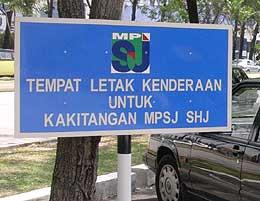Congratulation to the DAP, PKR and PAS (Pakatan Rakyat, PR) on their success in the 12th general election.
I hope that the leadership acknowledges that a number of seats were won by a slim majority. It is crucial that the BR works four times as hard as they did, as the Barisan Nasional (BN) will work twice as hard to win back the minds and hearts of the people.
The unhappiness of the people is rooted in the rising cost of living, rising corruption, rising crime rate, the New Economic Policy, and creeping Islamisation.
For PR to repeat its success in the next general election or to even perform better, it must tackle these as well as countless other issues. The first three would be easier to tackle as it affects all Malaysians whereas the last two may be deemed sensitive.
However, with consensus, changes can be made to benefit all segments of society.
Rising cost of living
Many Malaysians have been hit by the rising cost of living since 2004. The prices of petrol, water and electricity - three basis necessities - have risen significantly and with a domino effect, prices of various goods and services have followed suit.
The PR leadership must introduce various initiatives that will address the rising cost of living instead of publishing impressive GDP growth rates that have no meaning for the average citizen.
Reduce charges imposed by state/local council
 PR state governments could address some of the issues by reducing some charges imposed by state governments (and local councils) such as quit rent, assessment and parking charges.
PR state governments could address some of the issues by reducing some charges imposed by state governments (and local councils) such as quit rent, assessment and parking charges.
The Kedah government must be applauded for announcing a 30 percent reduction in quit rent and assessment rates.
However, PR state governments should ensure that revenue collection is sufficient for sustainable development and emergency purposes, or they would have to run to the BN-led federal government for aid.
Reduce cost of doing business
The PR state governments could reduce the cost of doing business. Many traders and small businessmen have complained about the high cost of doing business, in the form of ‘under the table’ paid to the local council. As the new administrators, it is vital that the PR eradicates corrupt practices in local councils. It is said that ‘when there is too much discretion, corruption will follow’. For the PR to eradicate corrupt practice, clear rules must be laid out.
Take for example, alfresco dining and whether this should be allowed. In my opinion, this has become part of the Malaysian culture and would be very difficult to ban. What local councils need to do is regulate it to make it safer; at the same time, this would add revenue to the state coffers.
 The same goes for illegal hawkers/petty traders. The solution is proper regulation and not constant harassment and collection of
duit kopi
. The government must give opportunities to the average citizen to earn an honest living.
The same goes for illegal hawkers/petty traders. The solution is proper regulation and not constant harassment and collection of
duit kopi
. The government must give opportunities to the average citizen to earn an honest living.
Illegal hawkers and petty traders should be licensed and regulated to ensure proper hygiene and safety; at the same time, they will contribute to state revenue. Suitable venues with adequate facilities and reasonable rental rates should be provided, so that hawkers and petty traders can operate in peace and customers can shop in comfort.
With reduction of cost in doing business, the savings can eventually be passed to consumers, thus reducing some of the rising costs.
Reduce charges imposed by utility companies
To reduce the cost of utilities such as electricity and water, PR should apply pressure on the federal government. The 2007 Annual Report of Tenaga Nasional Bhd (TNB) reveals that in 2003, it made a profit before tax (PBT) of RM1,648.5 million. In 2007, this increased to a whopping RM4,765.9 million - by 289 percent, or an average of 57.8 percent year-on-year.
 However, TNB still claims that it desperately needs to increase the tariff-rate in order to survive. Excessive profit-taking by GLCs is obscene when it is at the expense of the people. The tariff agreement with TNB should be renegotiated downwards.
However, TNB still claims that it desperately needs to increase the tariff-rate in order to survive. Excessive profit-taking by GLCs is obscene when it is at the expense of the people. The tariff agreement with TNB should be renegotiated downwards.
TNB pays dividends to its shareholders, which includes the government but what about the people, who are its biggest stakeholder? It should give an annual rebate, equivalent to say 1 month’s electricity bill, to both consumers and corporations.
Selangor Menteri Besar Khalid Ibrahim has said that the state government intends to renegotiate the water agreement signed earlier with Puncak Niaga Holdings Bhd and to declassify the document from the ambit of the Official Secrets Act 1972. This is a welcome move.
Puncak Niaga’s 2006 Annual Report reveals that it made PBT of RM180.11 million in 2002 and RM367.28 million in 2006; or an increase of 203.9 percent or 40.8 percent year-on-year.
Increase revenue through training programmes
The PR must provide training programmes to increase the knowledge and skills of the people. Khalid has announced a special programme for youths with a “guaranteed minimum salary” upon graduation. This should be extended to other groups badly hit by rising costs, such as single mothers and retirees. It would help reduce the country’s dependence on foreign labour.
Increase revenue through Foreign Direct Investment
Penang and Selangor enjoy the lion’s share of FDI in Malaysia. PR should ensure that FDI is retained and news sources are attracted into its states. Investors should be encouraged to employ locals - in this respect, Khalid’s proposal to impose a levy on foreign workers could be seen as investor-unfriendly or discriminatory. Incentives should be provided to investors to hire locals. These could be in the form of lower quit rent and assessment rates.
Revamp management
John Emerich Edward Dalberg Acton (1834–1902) said “Power tends to corrupt, and absolute power corrupts absolutely. Great men are almost always bad men".
The PR must revamp the way their states are managed and allow civil servants to serve. When the latter see the wisdom of the new policies, they will give their full cooperation.
 These governments will be able to review all past contracts and report any wrongdoing to the relevant authorities. They must obtain sound legal advice before rescinding contracts or they may be exposed to payment of compensation, as the ‘crooked bridge’ fiasco in Johor amply illustrates.
These governments will be able to review all past contracts and report any wrongdoing to the relevant authorities. They must obtain sound legal advice before rescinding contracts or they may be exposed to payment of compensation, as the ‘crooked bridge’ fiasco in Johor amply illustrates.
Changes are also needed in the way local councils are managed, including making financial statements public for inspection. This will ensure greater accountability and end the days of ‘sports club donations’.
The process of awarding contracts or the practice of introducing ridiculous rules should be reviewed as well. For instance, a certain local council wants pest-control companies registered on its ‘panel’. There are already laws regulating such companies, so why create additional rules?
Local councils must give adequate notice and take into consideration the concerns of affected residents before approving projects that are likely to cause controversy - such as designating areas for a cemetery or incinerator or hillside projects.
DEREK LAW is a chartered accountant and retired banker. His ultimate dream is for politics in Malaysia to rise above religion and race.

